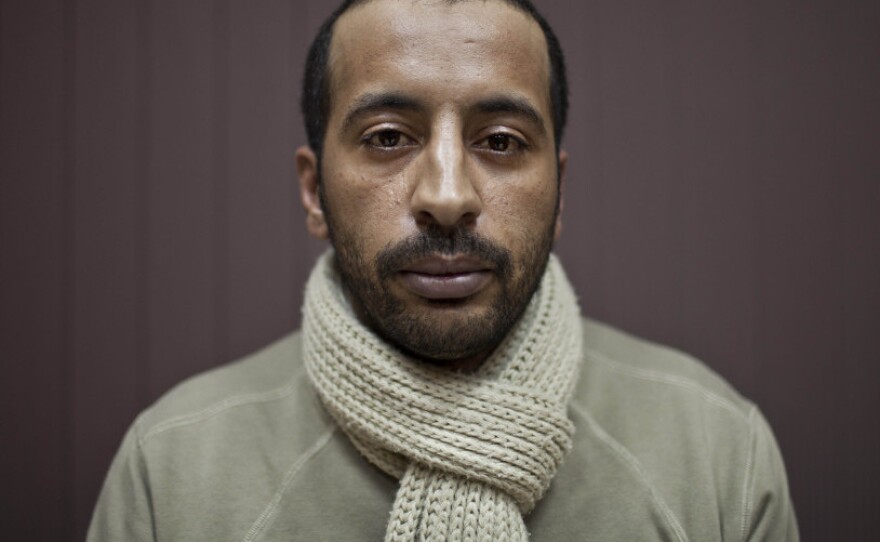While all eyes are on the Libyan capital of Tripoli, a small town on the Mediterranean coast has emerged as a key battleground in the uprising against leader Moammar Gadhafi.
Sirte is Gadhafi's hometown, located about halfway between Tripoli and the eastern city of Benghazi, the main rebel stronghold. Sirte remains in the hands of pro-Gadhafi forces, and rebel commanders say it has assumed strategic importance.
It's one city in Libya where rebel forces do not seem to be making any inroads.
Juma'a, a policeman in Sirte, says there are about 4,000 troops loyal to Gadhafi there now. In addition, the regime has armed local tribesmen who will fight for him if necessary.
"This town is very important to Gadhafi because it's where he comes from," Juma'a said by telephone during a visit to his family in Benghazi. "His tribe, his supporters, his relatives, all are from there. The people of Sirte are afraid that if the regime falls, there will be reprisals against them."
Juma'a says Sirte is not only symbolically important. "It has a strategic position. It is a link between the east, the west and the south. All roads go through Sirte, and so strategically, he has to keep control there if he wants to stay in power."
A Major Obstacle
Rebel commanders in Benghazi know that as well. One, Col. Tarek Saad Hussein, says he is calling on the people of Sirte to rise up against Gadhafi. His message, he says, is "you are either with us or against us." And he adds that Sirte has become a major obstacle to the spread of the rebellion.
Inside Sirte, pro-Gadhafi security forces are allegedly using brutal tactics to keep the city in their hands.
Adel Idris says he recently escaped from a prison in Sirte, arriving in Benghazi and safety after nine days of what he calls a sojourn in hell. He spoke to NPR for several hours about his experiences — his hands shaking — switching between broken English and Arabic.
"I'm so tired, so sad," he says. "I'm not normal, really."
He stops talking and stares into the distance. He does that a lot during his narrative.
Idris was arrested nine days ago, just after the protests against Gadhafi began in the east.
He says he'd been an activist for many years, and he was well-known to the local branch of internal security. His body bears the scars of previous abuse at the hands of Gadhafi's men — including cigarette burns and slash marks on his arm where he says he was cut during other incarcerations.
'I Not Give Up'
After his most recent arrest, however, he was put to work. He's an engineer who works in IT, so he was forced to inspect the computer files of suspects held in detention by the tech-illiterate security guards.
Every day, he says, brought some new horror. They tortured a man's young nephew in front of him to extract a confession. He says the man had been discovered with anti-Gadhafi material on his computer. He says he tried to delete the worst of it before it was discovered, but it wasn't enough.
Another day he witnessed the rape of several young men.
He says there also were 25 women in the prison. "Every night, I hear the women scream, but I don't know what happened with the women," he says.
He imagines the worst.
As he talks, he plays with a ring on his finger. It's the engagement ring of his cellmate. He says the man was executed with a bullet to the head. Just before he was taken away, he handed the ring to Idris and asked him to return it to his family.
In addition to the torture and the executions, Idris says the guards also used dogs to terrify the prisoners.
"What he do with me there with his dogs — I not give up. Never to give up. I not cry. I not scream. ... It's first time I cry now," he says.
NPR has no way to corroborate his story. Others imprisoned during this uprising who have spoken to NPR also have alleged they were tortured.
Idris says he finally managed to escape with the help of a sympathetic guard. He says he doesn't know what happened to the guard.
Idris has tried to call and thank him now that he is safely in Benghazi, but he hasn't been able to get through to Sirte.
Copyright 2022 NPR. To see more, visit https://www.npr.org. 9(MDAzMjM2NDYzMDEyMzc1Njk5NjAxNzY3OQ001))







